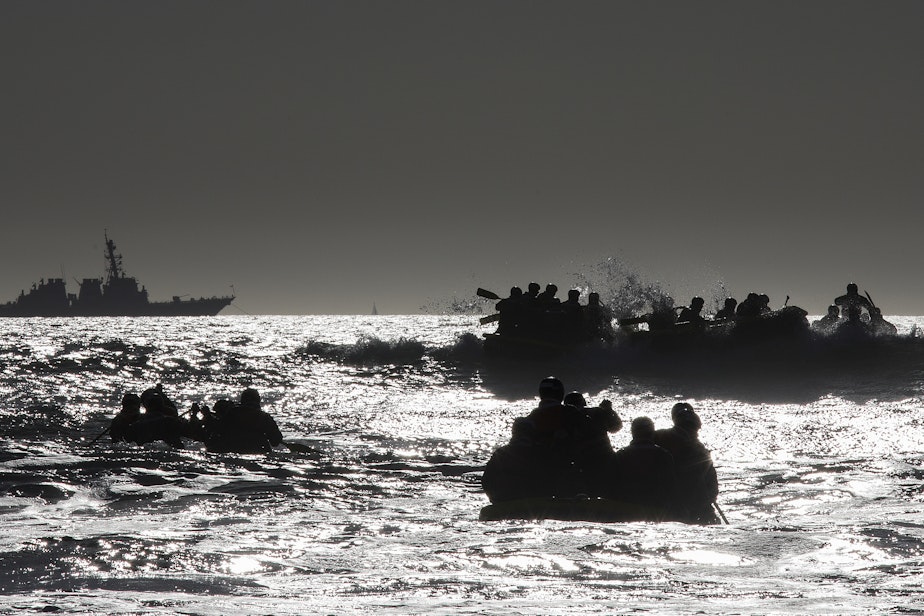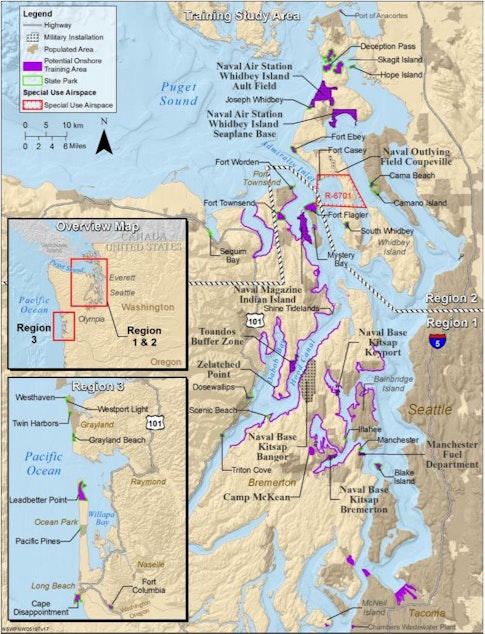Coming soon to a park near you? Navy SEALs

The U.S. Navy has been quietly training Navy SEALs in a handful of Washington State Parks for more than 30 years. Now the Navy wants to expand its special-ops training exercises to 29 state parks, from Deception Pass to Cape Disappointment.
Navy SEALs come from Hawaii to do cold-water training exercises in, and stealthily emerging from, Puget Sound.
Spokesperson Sheila Murray in Silverdale said the Navy has an obligation to give the best training possible and the SEALs can’t get that by repeatedly approaching just five parks.
“They need to be able to maneuver and be used to go into areas where they’re not familiar with the environment,” Murray said.
“We haven’t received any formal application from the Navy to expand their training operations at state parks,” Washington State Parks and Recreation Commission spokesperson Anna Gill said. “But we do expect that will happen shortly.”
The Navy’s permits to use the five state parks -- Blake Island, Fort Flagler, Illahee, Mystery Bay and Scenic Beach -- expire in May.
Sponsored
“Navy SEALs have been safely training in Washington State Parks, without incident, for more than 30 years,” Rear Adm. Scott Gray said in a statement emailed to KUOW. “Will tourists and children be traumatized? No, the Navy has never had a complaint.”
In an environmental assessment published in 2018, the Navy concluded that the expanded training would have no significant impacts on parks, their visitors or their wild denizens.
The Navy’s proposal would put up to eight trainees and 26 support personnel ashore and offshore at any given park, for anywhere from 2 to 72 hours at a time. A park could be used up to 36 times a year.
According to the proposal, a typical training could involve SEALs launching small boats or submarines from a nearby boat ramp, entering the water and swimming ashore, “clearing” a building, then swimming back to their vessel. Swimmers would not be allowed to carry actual weapons but could carry rubber replicas.
Gray said no one would know the SEALs were there.
Sponsored
“That’s the point,” he said.
Opponents say parks and war games don’t mix.
“Parks are for people who are seeking relaxation,” Anne Harvey with the Sound Defense Alliance on Whidbey Island said. “We’re really concerned about the impact on families who are there to relax and enjoy the natural world.”
Her group’s mission is to defend against harmful impacts of military activity around Puget Sound and the Olympic Peninsula. She said she views this proposed expansion, and the Navy’s claim that it would have no impact, as part of an ongoing military expansion in Puget Sound.
“The Navy has also said that about the Navy Growlers, and there is impact. On people’s health, and on children,” Harvey said. “As we are speaking, a Growler is flying overhead,” she said during a telephone interview.
Sponsored
Twenty-four Whidbey Island residents sued the Navy in September over the noise from increasing operations of Navy Growler jets.
Navy SEALs also do cold-weather training on Alaska’s Kodiak Island, the nation’s second-largest island. With a population of just 6,000, there’s no decompression chamber for divers recover from diving accidents. SEAL trainings on Kodiak are focused on overland, not underwater, operations.
The Washington State Parks and Recreation Commission meets bimonthly around the state, with upcoming meetings Mar. 12 in Chelan and May 7 in Port Townsend.


